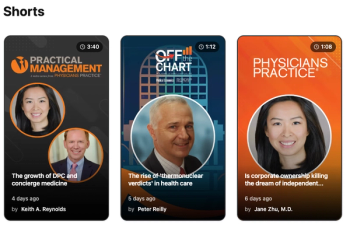
MGMA 2022: Regulatory burdens growing for physicians, survey says
COVID-19 pandemic conditions get better, but more red tape blocks care for patients.
COVID-19 pandemic conditions are getting better, but red tape and paperwork are getting worse in the last year, according to a survey of physician practices and health care system leaders around the nation.
The Medical Group Management Association published its
If the poll was an election, increasing overall regulatory burden would win in a landslide, with 89% of respondents reporting it got worse in the last 12 months. If that burden was reduced, 97% of respondents said that would allow them to reallocate resources toward patient care.
“In a time of runaway inflation and unprecedented workforce shortages, the federal government is layering on additional regulatory burdens that, while in theory are beneficial to patients, act more as an impediment to delivering care,” said Anders Gilberg, MGMA’s senior vice president of government affairs, said in a news release. “From longstanding challenges associated with the Quality Payment Program, to new obstacles related to the No Surprises Act, it is evident that policymakers must consider the totality of these burdens and their ultimate impact on patient care.”
The results were published on Oct. 11, the day when MGMA was concluding its 2022 Medical Practice Excellence Leaders Conference.
Burdens in medicine
The top contenders for consuming the most time and effort in physicians’ practices, with percentages of respondents reporting it very or extremely burdensome:
- Prior authorization, 81.93%.
- Surprise billing and good faith estimates, 70.45%.
- Medicare Quality Payment Program, 64.56%.
- Audits and appeals, 63.90%.
- Translation and interpretation requirements, 50.75%.
- Lack of electronic health record interoperability, 50.44%.
- Medicare and Medicaid credentialing, 41.17%.
The COVID-19 pandemic has not yet dropped out of sight, with 42.38% of respondents calling the very or extremely burdensome.
Prior authorizations
Getting prior authorizations from payers has caused 89% of practices to hire additional staff or redistribute current staffing resources to process prior authorizations due to the increased number of requests, according to the survey.
Along with an expense to physician practice resources, doctors, patients, and their advocates argue the processes delay patient care unnecessarily, according to MGMA.
“The increase in prior authorization requirements year after year is simply unsustainable,” Gilberg said. “Practices are being forced to divert resources away from delivering care to contend with these onerous and ever-changing requirements. It is time that Congress acts to put commonsense guardrails around prior authorization programs. We urge the expedient passage of the
That act has been approved in the U.S. House of Representatives and has strong support in the Senate, along with backing by numerous medical associations.
No Suprises Act
The federal
In the survey, 82% of respondents said the required uninsured or self-pay good faith estimates have increased administrative burdens on their practices.
Meanwhile, health care
Newsletter
Optimize your practice with the Physicians Practice newsletter, offering management pearls, leadership tips, and business strategies tailored for practice administrators and physicians of any specialty.






